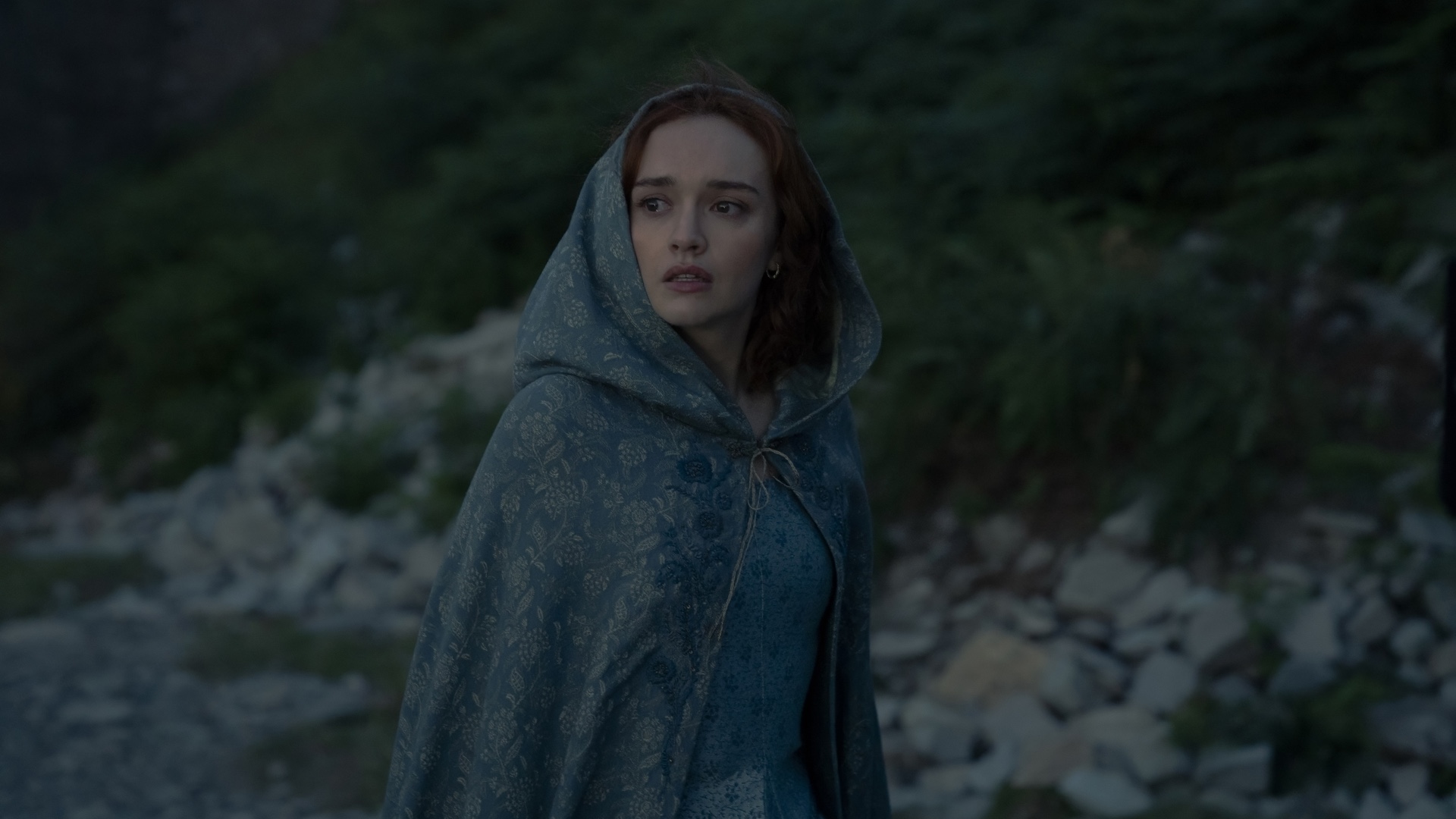
This article contains major spoilers for House of the Dragon season 2 episode 8 “The Queen Who Ever Was.”
As surely as the seasons change and winter comes, the fortunes of our lives remain forever in flux. But few, including Rhaenyra and Alicent, would dream they’d turn this fast. Aye, not even a full season ago, House of the Dragon featured a surprising detente between Queen Rhaenyra, the ruler who was chosen by King Viserys I to be his heir, and Queen Alicent, the wife of Viserys who played a pivotal role in usurping Rhaenyra’s claim.
The moment was shocking partially because no such event occurred in George R.R. Martin’s book on which the show is based. As far as the Westerosi historians know, Rhaenyra never sneaked into King’s Landing, the belly of the beast for her enemies, nor did she once attempt to entreat with a girlhood friend named Alicent. However, the bigger shock about the scene for viewers—whether they read Martin’s Fire & Blood or came to this show totally unsullied—stems from the idea of thinking for an instant that Alicent would entertain Rhaenyra’s arguments.
Alicent is a woman who has always felt compelled to do her duty as she sees it, and that duty flows from what is expected of her by the world at large. Originally that came in the shape of her obligations as a dutiful daughter who was essentially pimped out as a child to the king. Later duty looked like a Queen Mother who sought desperately to ascertain the best claim and position for her son and family.
Either way, Alicent played by the rules as they were written down by men, and often at the expense of herself. As Rhaenys fatefully surmised of Alicent in House of the Dragon’s first season, “You desire not to be free but to make a window in the wall of your prison. Have you never imagined yourself on the Iron Throne?”
The answer then, as now, is obviously no. And yet, how Alicent imagined herself has changed mightily between the beginning of season 2 and Sunday night’s finale, “The Queen Who Ever Was.”
While the finale has been fairly criticized for failing to move most of its meandering story threads forward in a satisfying manner ahead of a two-year hiatus, Alicent’s arc is not one of those unfulfilled promises. In fact, despite representing one of House of the Dragon’s biggest departures from the source text, the Queen Mother’s journey to some form of bitter self-awareness is one of the most fascinating, if despairing, elements of season 2.
It came to a head too when she met Rhaenyra five episodes after Alicent told her that it was too late for peace. Blood has been spilled. Rhaenyra reminds Alicent of those words when the two converse again in one of the libraries or studies on Dragonstone. When the former friends met earlier in the season, it was nominally in the light of the gods, beside the vibrant candles lit in the Great Sept in honor of the Seven. And yet, when Alicent comes hat in hand to Rhaenyra in the finale, it is at the Hour of the Wolf and in total darkness. The shadow which now consumes Alicent’s countenance represents the moral ambiguity she suddenly found herself noticing after a lifetime of self-denying delusion.
Since these women’s last exchange, Alicent has seen her rank in the Green Council stripped by one son, a power-mad Prince Aemond, who now makes himself regent. Her other son and technical king, Aegon II, is meanwhile covered in scars and burn wounds, and seemingly on death’s door, thanks again to Aemond. Aegon of course has always been something of a disappointment to a mother who turned a blind eye to his every indulgence. Still, it’s heartbreaking to see him broken and battered on a sick bed… just as it’s telling that after seeing he will likely never rule again that Alicent left his side for her favored maester to attend. Curiously, Larys Strong has been more of a parent to the wounded son.
But at the moment, Alicent is a little preoccupied: she’s been shorn of all illusions of influence and power; she’s even been forced to remember the truth in Rhaenys’ words. She is in a prison. It might not be of her own making, but despite decades of nominal deference as queen, the only thing she added to it was that window. And now her sons have barred even that.
Recognition of this is why in the finale she ends up on Rhaenyra’s doorstep and makes an eyebrow-raising offer: she will ensure King’s Landing is unguarded and unprotected for Rhaenyra’s army should the Black Queen wish to take the capital and supposedly end the war.
This is a massive departure from George R.R. Martin’s Queen Alicent, who by this point is still very much the woman in green who would sooner die than see Rhaenyra’s bastards ascend the throne over her sons. It no longer even feels like a spoiler to note that the only major exchange Martin records as having occurred between these two after this point in the war is when Rhaenyra summons Alicent’s presence following a hostile take over King’s Landing. Certainly no turncoat enabler of the conquest, Alicent is still unable to comprehend in that moment how this woman could one day place a bastard like Jacaerys on the Iron Throne.
That scene will clearly not occur with an Alicent who days ahead of the invasion offers to be the traitor who will prepare the city for Rhaenyra’s arrival. Obviously some book readers will be disappointed by the change, but it makes Alicent a much more compelling character.
By repositioning the Dance of the Dragons as a war between two queens, or at least two women influenced and constrained by the barbarically patriarchal system around them, House of the Dragon accentuates the underlying cause of the whole war: the inherent misogyny of men who would rather see their world burn than a woman ascend to a position of power.
House of the Dragon has underlined that point by focusing on two women: one who seeks to fight that double standard, and one who embraces it out of a sense of duty, familial loyalty, and even love. But so much of House of the Dragon’s second season has been about methodically removing those treasured principles from Alicent and forcing her to see the world as it is, not as she likes to pretend it could be. As a consequence, every time she and Rhaenyra share a scene now, it comes with the titanic pressure of each woman’s worldview being tested, hardened, and often darkened in the intervening episodes.
Emma D’Arcy and Olivia Cooke have an obviously crackling chemistry, and it’s on full display even as it’s made to curdle in the shadow of disgust.
“Go then,” Rhaenyra sneers in the finale, “leave us behind as you say. Wander in the wilderness.” D’Arcy face reveals a contempt so total that it could only spring from a place of squandered and lost affection. Cooke, in turn, echoes the scared little girl Emily Carey played in House of the Dragon’s earliest episodes. She nibbles at her fingernails, recalling the bad habit her father berated—and the worse insecurities it betrayed before they were buried down deep. They pour forth now on Cooke’s face like a slowly rising riverbank that threatens to turn into a flood.
At the end of the day, Alicent is still a child desperate to be liked: by her father, her king and husband, and then the men around the small council’s table. Finally, after they all sent her back to the proverbial kitchen—or her rarified studies and gardens in the world of the court at the Red Keep—she is at last left with only one person from which she can seek approval: the best friend she betrayed.
Conversely, Rhaenyra was forced long ago into vivid awareness of the world’s double standards and hypocrisy. It began after Otto Hightower swore fealty to her and then made his daughter queen and produced a grandson that stole half the court’s attention, affection, and finally allegiance. Tonight the hour is late, and time is short, and she has no time to live in what she sees as Alicent’s latest delusion: a life of quietude and peace for herself, her daughter, and granddaughter.
“What of Aegon?” Rhaenyra finally demands. “Still you defend him. Still you imagine you can have all you want without paying too high a price. A price I have no choice but to pay.” Rhaenyra forces Alicent to dispel the one last lie she clings to: this war can end without the son she strived and sacrificed everything for dying.
“I must take Aegon’s head, and I must do it for all to see,” Rhaenyra tells Aegon’s mother. “You know this. However you may try to evade it, you know this.” Alicent does, and in an agonizing admission, she agrees to let her son die if it offers Alicent the chance for her and Helaena to be free.
This is a devastating sequence to watch unfold. Alicent surrenders her oldest boy in the hope of saving her only daughter. It also reflects a profound change in the character. Not perhaps in her love for Aegon, which was quietly smothered every time she covered up one of his rapes, bastards, and other abuses. She, again, spent less time by his seeming deathbed than Larys or the maesters. Yet, strikingly, Alicent is now placing more value on her daughter’s well-being, and the next generation of Hightower women in the granddaughter whom Helaena saved from Blood and Cheese, than she is in Aegon’s broken and seemingly dimmed future. She’ll trade the heir she supplanted Rhaenyra with for a girl’s life.
It’s a stunning reversal for Alicent and suggests she might even be reaching a greater sense of perspective about the futility of this war than Rhaenyra is.
Consider that while Rhaenyra is right to force Alicent to face the horror of what she’s doing—giving up a son to save a daughter (much like Haelaena did at the beginning of the season)—Rhaenyra is making the little kind of moral compromises she chastises Aemond over. She burned scores of smallfolk to find a few new dragonriders last week, at least one of whom is of dubious loyalty. And now she’s sent those same dragonriders off to burn yet more innocents in the name of winning this war.
Rhaenyra is offered a way out by Alicent, but obviously will not take it. “My part is here,” Rhaenyra insists, “whether I will it or no. It was decided for me long ago.”
Alicent obviously sounds fanciful and still in denial during this major sequence. She thinks she can “be free” in a world where women have little hard power, and all without the title of “queen,” “Hightower,” or “Targaryen.” But does not Rhaenyra herself sound like Alicent while talking to Rhaenys in the first season? She claims her path is “decided,” apparently by her father who trusted her with the obligation to rule and fight the coming of the White Walkers and a second Long Night.
As several viewers have already noted about this week’s finale, Rhaenyra is herself filmed through windows and in her study surrounded by the weight of history and text. All those words—each and every one of which is written by a man—weighs down on her and shackles her to a fate just as thoroughly as Alicent was imprisoned by old Otto’s machinations. The weight of expectations from a world that refuses to accept her traps Rhaenyra now mayhaps more than Alicent.
There is poetry to this irony, even if House of the Dragon somewhat muddles it with “the Prince That Was Promised” prophecy suggesting Rhaenyra is fated to suffer the horrors that are to come in order for her great-great-great-granddaughter, Daenerys Targaryen, to… also be roundly rejected by the men of Westeros?
Maybe House of the Dragon really is suggesting Alicent is the first of the two women to break out of her prison cell? To the Seven Hells with the Realm, the men who run it, or the White Walkers who will consume it. If so, it will make the wars to come all the bitterer as the dragons dance.
The post House of the Dragon Has Completely Rewritten Alicent’s Arc For the Better appeared first on Den of Geek.











